
views
Making Decisions

Determine the job title. Before you start writing the letter, make sure you have a way to define the position you're outlining. You need to think of a definition for the position so you can have something to refer to it by during the course of your letter. Think about the function of the job. Do you need someone to proofread articles for a magazine you're writing? That person could be called an editor or a copywriter. How much responsibility will this person have? If they will be answering to a higher up editor in the department, maybe the position title could be Junior Copywriter.
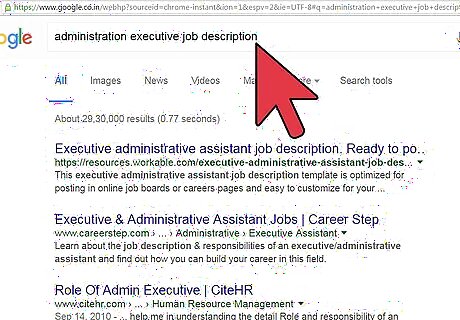
Do any necessary research. You want to make sure you know your facts before writing a business proposal. You'll have to include certain specifics, like a budget and salary, in order to make the proposal realistic and informative. Make sure you can justify why this position is necessary. You may, for instance, feel that establishing this job will help the company cut costs. Let's return to the Junior Copywriter position. If your company hires a great deal of freelance writers, and pays them by the hour, they may have to edit their own work. If your company had a copywriter, whose salary was slightly less than a freelance writer, writers would not work as long. But don't stop there: there are other justifications besides cost. This may include a lower cycle time so that articles appear in print faster, higher quality by ensuring proper grammar and content, etc. Figure out a fair salary. Whether you're outlining a job for yourself or someone else, you want to make sure the salary you propose is reasonable. Spend some time researching the average salaries for similar positions. Keep in mind starter salaries are low, so you can aim to propose a salary or pay rate on the lower side of average. Review your company's budget. You want to know how this position will be paid for. If the positions eliminates some costs, estimate how much money will be saved. You can put that money into a budget for the new position. You can also find areas where your company has excess money, which they may occasionally put towards new job openings. See if you can use some of this money to fund a new position.
Writing Your Letter
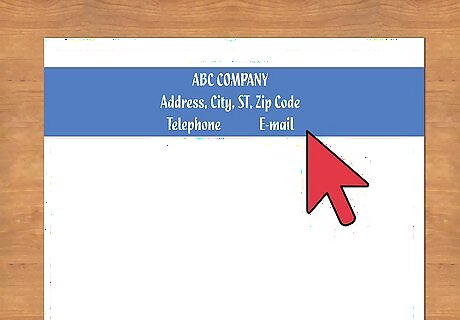
Format the letter correctly. You want to make sure you format a job proposal like a business letter. This will keep things looking professional, increasing your chance of having your proposal accepted. Pick a letterhead. If you're writing a justification for yourself, you should use the same letterhead you use for your resume. This will keep things consistent when submitting your materials. If you're writing a justification for a position within your own company, use the letterheads typically used for office memos and other business related writing. At the top righthand corner of your letter, write your name, your address, the date, the address of the business, and the name of the letter's recipient. Make sure you choose a proper salutation. If you're addressing a group of people, you can address all of them by their appropriate name and title and then add a colon. For example, "Dear Dr. Shepherd and Dr. Fox:"
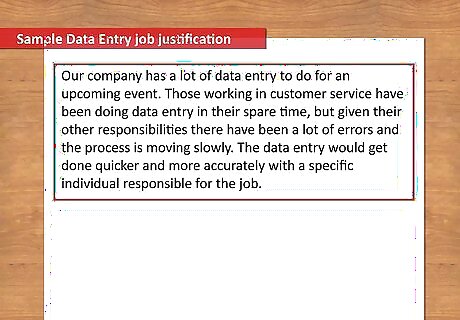
Begin by stating the benefit to the company. When opening your job justification, the first thing you want to do is show how it will benefit the company. Those reading the proposal are primarily interested in the wellbeing of a company. If they don't see how this position benefits them, they'll lose interest. Get to the benefits right away when writing a job justification. You can start by identifying an inefficiency or problem in the company that may need a solution. The consequences of the problem should be spelled out in detail, whether these are higher costs, poor quality product, etc. If there's a role you know needs filling, for example, you can point that out right away. You can also use some research here to backup your claims. Let's look at another example. Say your company has a lot of data entry to do for an upcoming event. Those working in customer service have been doing data entry in their spare time, but given their other responsibilities there have been a lot of errors and the process is moving slowly. Point out that the data entry would get done quicker and more accurately with a specific individual responsible for the job. Also, keep cost in mind. Your boss is probably interested in cost effective changes. Note the customer service reps have been putting in a lot of overtime hours, and the cost of a temporary new employee would be much less than paying so much in overtime. In the above example, you can do research on concentration. You may find some studies that say people work more efficiently and accurately when they concentrate on one task at a time.
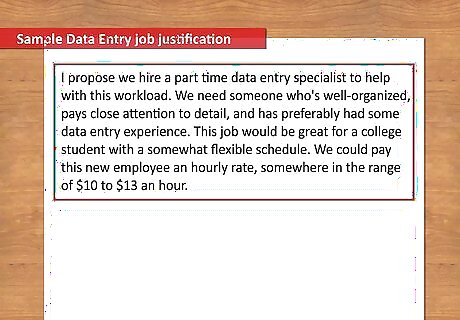
Describe the potential job in great detail. From here, describe the potential job in great detail. This is where you'll be using the title you came up with earlier. Outline what exactly the job entails and what kind of person would be ideal for the role. List what tasks the job requires, and what kind of skill set is necessary. You should also outline if the job is fulltime or part time and how it pays. You may want to include a brief profile of the type of person you're looking to hire. For example, "I propose we hire a part time data entry specialist to help with this workload. We need someone who's well-organized, pays close attention to detail, and has preferably had some data entry experience. This job would be great for a college student with a somewhat flexible schedule. We could pay this new employee an hourly rate, somewhere in the range of $10 to $13 an hour."
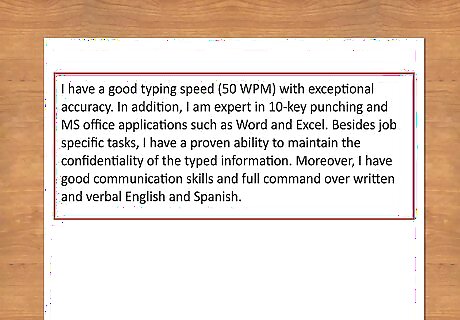
Outline why you are the right person for the job, if you're proposing a job for yourself. You may be writing a job proposal for yourself. If you've been working in a company for years, you may be volunteering to oversee a new project. You may also be applying from the outside. Sometimes, you can help yourself stand out by proposing a new job for a company for which you believe you'd be the ideal candidate. List your experience. Talk about what your background is, briefly overviewing your education and career experience. This is similar to a cover letter. Only include experience relevant for the job you're proposing. If you're proposing to do market research for a non-profit, definitely talk about your marketing internship for a local refugee center in college. However, it's probably unnecessary to disclose that you waited tables over the summer, unless the skills learned apply to the proposed job. You should also list any specific awards or achievements. This can be particularly helpful for an academic job. For example, if you're proposing you teach a new art history class at a university, you might want to mention any articles you've had published, grants you've received, or other honors you've obtained.
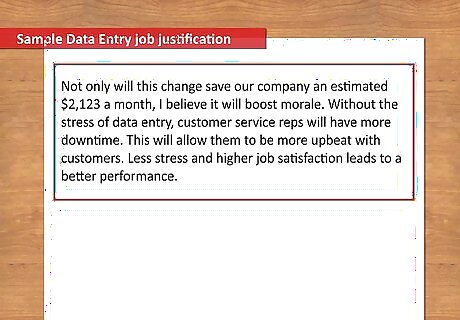
Talk about salary and costs. You want to make sure you convey you've done your research. People are likely to dismiss a proposal that does not seem well conceived. Outline how much the position will pay and point out how the company would afford these costs. Ideally, some of the costs should come from the money saved. If a chunk of overtime pay is no longer being given to customer service representatives, some of that money could go towards paying a new employee. A part-time employee at an hourly rate will cost much less overall than multiple full-time salaried employees receiving overtime pay. Make sure you clearly quantify just how much money they would be saving with this change. Try to focus more on how much money your company will save, in addition to non-financial benefits. Using the above example, you could write something like, "Not only will this change save our company an estimated $2,123 a month, I believe it will boost morale. Without the stress of data entry, customer service reps will have more downtime. This will allow them to be more upbeat with customers. Less stress and higher job satisfaction leads to a better performance."
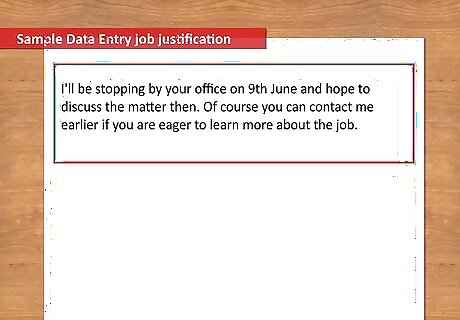
Finish with a call to action. You want to leave the readers of your letter feeling enthusiastic about the new position. End your letter with a call to action, encouraging employers to create this new position. Reiterate the points you made previously. In a few sentences, wrap up the main benefits of the position and talk about how it's necessary for the company. Talk about how you'll be in touch. Say you'll call later in the week to follow up, for example, or request a business meeting with your boss to further discuss the position.
Revising Your Letter
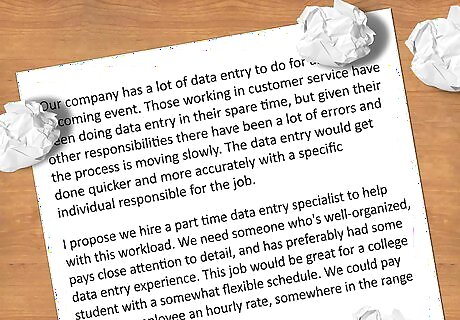
Write a few drafts. You want to make sure you write a few drafts of your proposal. After writing the initial draft, set it aside for a few days. Then, look it over after you've had time to think. Rewrite the letter, adding in any new information or insights you thought of. If you have time, try to write at least a few drafts of your justification.
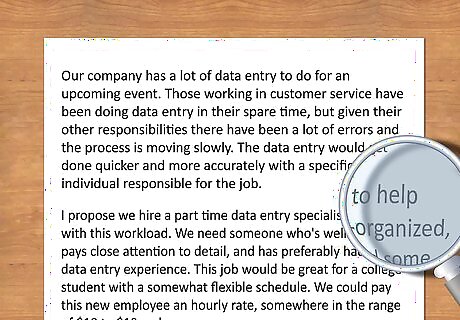
Proofread for typos. You should not turn in a job justification with typos. Proofread the letter a few times, making sure it's free of spelling and grammatical errors. It can be difficult to catch your own typos, but there are some tips and tricks that can help. Give yourself some time. You're more likely to catch typos if you set your work aside for a few days. If you don't have a few days, try setting it aside for an hour and then rereading. Print out your letter. Changing the format from which you're reading can help you better check typos. If you don't have a printer, consider changing the font type or color. You can also try reading your letter from the last paragraph to the first. Force yourself to reach each word by placing the tip of a pencil against the screen or page. Reading your letter out loud can also help you focus on each word.

Have a friend look over your letter. A second set of eyes can catch typos you may miss. People often go "typo blind" when reading their work, meaning they miss their own errors as they read what was written in their head. Having a friend read your letter over can help you catch typos.
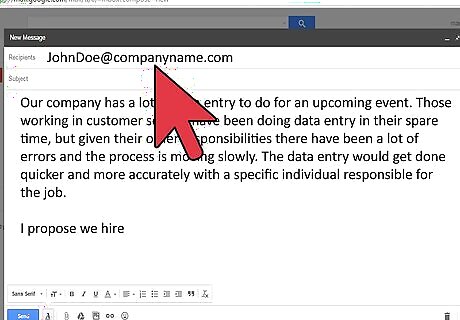
Send your letter out. Once your letter is professional and polished, send it out. Make sure you send it out the proper way. If your company uses wooden cubicles for physical mail, print it out and put it in the cubicle. If your company prefers e-mail attachments, e-mail the letter to your boss.




















Comments
0 comment